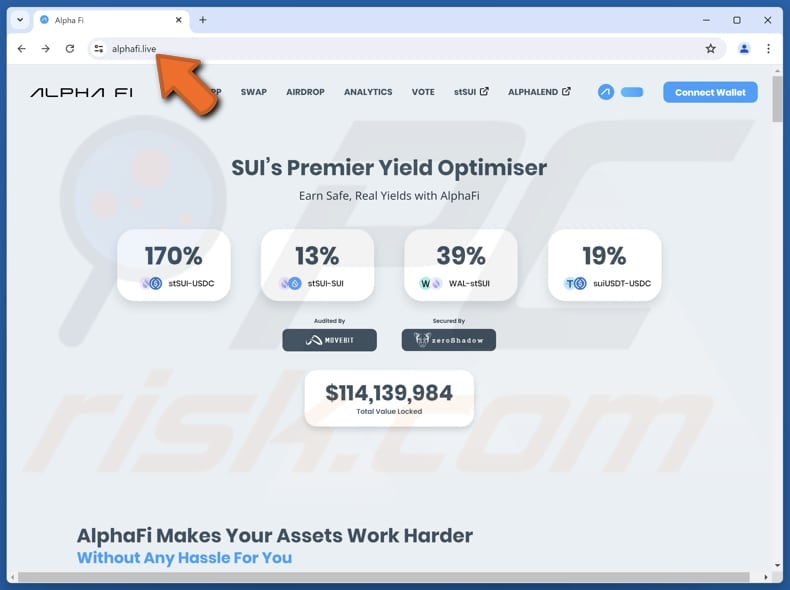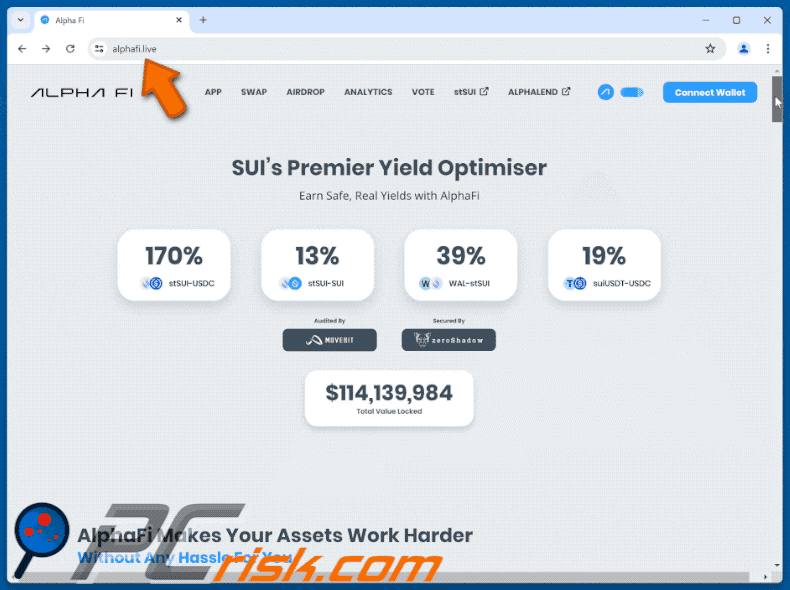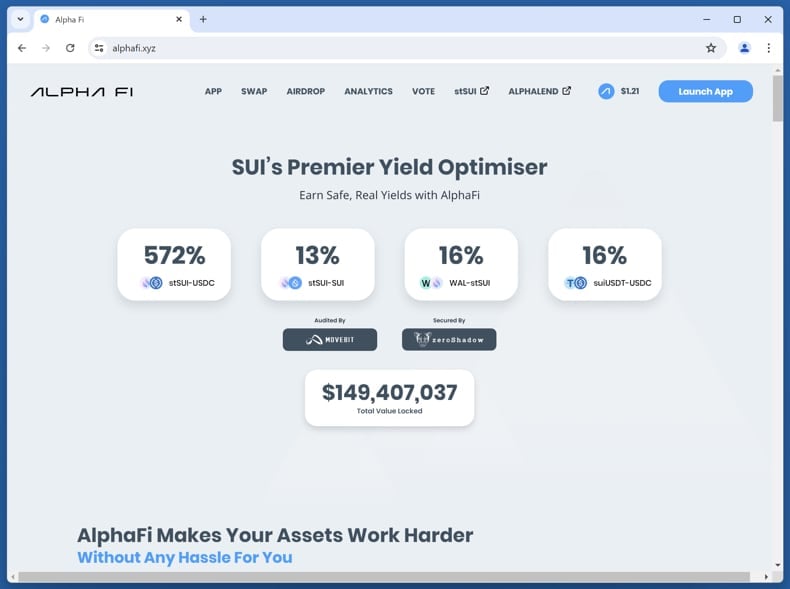How to identify scams like the "Fake Alpha Fi" page
Phishing/ScamAlso Known As: Fraudulent Alpha Fi platform
Get free scan and check if your device is infected.
Remove it nowTo use full-featured product, you have to purchase a license for Combo Cleaner. Seven days free trial available. Combo Cleaner is owned and operated by RCS LT, the parent company of PCRisk.com.
What is a fake Alpha Fi website?
Our team has inspected the website (alphafi[.]live) and found that it is a copy of the original AlphaFi site (alphafi.xyz). The fake page has a very similar design and is created to steal personal information from individuals. The consequence of falling for this scam can be significant monetary loss.

IMPORTANT NOTE: We do not review crypto projects, please do your own research when investing money.
Federal Trade Commission (FTC) states that since the start of 2021, more than 46,000 people have reported losing over $1 billion in crypto to scams – that's about one out of every four dollars reported lost, more than any other payment method.
Fake Alpha Fi website in detail
AlphaFi (alphafi.xyz) is a platform on the SUI blockchain that helps both new and experienced crypto users earn more from their digital assets. It makes it easy to deposit your coins safely and uses effective strategies to get the best possible returns. By using the latest tools in the SUI network, AlphaFi works to help users grow their earnings efficiently.
The fake website (alphafi[.]live) is made to appear very similar to the original one. Scammers created this site to deceive visitors into believing they are interacting with the real platform. Their main goal is to trick users into entering sensitive information, such as their seed phrases, which are private keys used to access cryptocurrency wallets.
Once scammers obtain these seed phrases, they can gain full control over the victims' digital assets. They can transfer the funds to their own accounts, leaving the victim with little or no chance to recover the stolen assets. Because blockchain transactions are irreversible, reversing these thefts is extremely difficult.
This type of scam highlights the importance of verifying website URLs and being cautious when entering sensitive information online.
| Name | Fraudulent Alpha Fi platform |
| Threat Type | Scam, Social Engineering, Fraud |
| Disguise | Official Alpha Fi site |
| Related Domain | alphafi[.]live |
| Detection Names (alphafi[.]live) | SOCRadar (Malware), Full List Of Detections (VirusTotal) |
| Symptoms | Unofficial domain, lack of official verification, unrealistic claims, too good-to-be-true promises |
| Distribution methods | Fake social media accounts, deceptive websites, rogue online advertisements |
| Damage | Cryptocurrency theft |
| Malware Removal (Windows) |
To eliminate possible malware infections, scan your computer with legitimate antivirus software. Our security researchers recommend using Combo Cleaner. Download Combo CleanerTo use full-featured product, you have to purchase a license for Combo Cleaner. 7 days free trial available. Combo Cleaner is owned and operated by RCS LT, the parent company of PCRisk.com. |
Similar scams in general
In most cases, scams of this type mimic real platforms and promise users cryptocurrency or other rewards. In reality, their true purpose is to deceive users into taking actions that allow scammers to steal their cryptocurrency. Staying cautious online and carefully checking websites is crucial to prevent financial loss or other problems.
Some examples of other crypto scams are "Gigabrain Token Airdrop", fake "Humanity Protocol" website, and fake "GMGN" website.
How did I open a scam website?
Fraudulent crypto-related websites are often promoted through hacked or fake social media accounts on platforms like X (Twitter) and Facebook, as well as through compromised WordPress websites. Users can also be led to these scam sites by malicious emails, unwanted notifications, or adware.
Additionally, shady advertising networks on torrent sites, illegal streaming services, and similar platforms, along with misleading ads, pop-ups, links, or buttons on suspicious websites, are commonly used to attract users.
How to avoid visiting scam pages?
Download apps and files only from official websites or reliable app stores. Make sure your operating system and software are regularly updated, and use reputable security programs to safeguard your device. Always verify emails before clicking any links or opening attachments. Do not engage with messages that seem unexpected, irrelevant, or come from unknown sources.
Avoid giving permission for suspicious websites to send you notifications and avoid interacting with pop-ups, ads, or similar elements on dubious sites. If your computer is already infected with unwanted apps, we recommend running a scan with Combo Cleaner Antivirus for Windows to automatically eliminate them.
The appearance of a fake Alpha Fi website (GIF):

The original Alpha Fi site (alphafi.xyz):

Instant automatic malware removal:
Manual threat removal might be a lengthy and complicated process that requires advanced IT skills. Combo Cleaner is a professional automatic malware removal tool that is recommended to get rid of malware. Download it by clicking the button below:
DOWNLOAD Combo CleanerBy downloading any software listed on this website you agree to our Privacy Policy and Terms of Use. To use full-featured product, you have to purchase a license for Combo Cleaner. 7 days free trial available. Combo Cleaner is owned and operated by RCS LT, the parent company of PCRisk.com.
Quick menu:
- What is Fraudulent Alpha Fi platform?
- How to identify a pop-up scam?
- How do pop-up scams work?
- How to remove fake pop-ups?
- How to prevent fake pop-ups?
- What to do if you fell for a pop-up scam?
How to identify a pop-up scam?
Pop-up windows with various fake messages are a common type of lures cybercriminals use. They collect sensitive personal data, trick Internet users into calling fake tech support numbers, subscribe to useless online services, invest in shady cryptocurrency schemes, etc.
While in the majority of cases these pop-ups don't infect users' devices with malware, they can cause direct monetary loss or could result in identity theft.
Cybercriminals strive to create their rogue pop-up windows to look trustworthy, however, scams typically have the following characteristics:
- Spelling mistakes and non-professional images - Closely inspect the information displayed in a pop-up. Spelling mistakes and unprofessional images could be a sign of a scam.
- Sense of urgency - Countdown timer with a couple of minutes on it, asking you to enter your personal information or subscribe to some online service.
- Statements that you won something - If you haven't participated in a lottery, online competition, etc., and you see a pop-up window stating that you won.
- Computer or mobile device scan - A pop-up window that scans your device and informs of detected issues - is undoubtedly a scam; webpages cannot perform such actions.
- Exclusivity - Pop-up windows stating that only you are given secret access to a financial scheme that can quickly make you rich.
Example of a pop-up scam:

How do pop-up scams work?
Cybercriminals and deceptive marketers usually use various advertising networks, search engine poisoning techniques, and shady websites to generate traffic to their pop-ups. Users land on their online lures after clicking on fake download buttons, using a torrent website, or simply clicking on an Internet search engine result.
Based on users' location and device information, they are presented with a scam pop-up. Lures presented in such pop-ups range from get-rich-quick schemes to fake virus scans.
How to remove fake pop-ups?
In most cases, pop-up scams do not infect users' devices with malware. If you encountered a scam pop-up, simply closing it should be enough. In some cases scam, pop-ups may be hard to close; in such cases - close your Internet browser and restart it.
In extremely rare cases, you might need to reset your Internet browser. For this, use our instructions explaining how to reset Internet browser settings.
How to prevent fake pop-ups?
To prevent seeing pop-up scams, you should visit only reputable websites. Torrent, Crack, free online movie streaming, YouTube video download, and other websites of similar reputation commonly redirect Internet users to pop-up scams.
To minimize the risk of encountering pop-up scams, you should keep your Internet browsers up-to-date and use reputable anti-malware application. For this purpose, we recommend Combo Cleaner Antivirus for Windows.
What to do if you fell for a pop-up scam?
This depends on the type of scam that you fell for. Most commonly, pop-up scams try to trick users into sending money, giving away personal information, or giving access to one's device.
- If you sent money to scammers: You should contact your financial institution and explain that you were scammed. If informed promptly, there's a chance to get your money back.
- If you gave away your personal information: You should change your passwords and enable two-factor authentication in all online services that you use. Visit Federal Trade Commission to report identity theft and get personalized recovery steps.
- If you let scammers connect to your device: You should scan your computer with reputable anti-malware (we recommend Combo Cleaner Antivirus for Windows) - cyber criminals could have planted trojans, keyloggers, and other malware, don't use your computer until removing possible threats.
- Help other Internet users: report Internet scams to Federal Trade Commission.
Frequently Asked Questions (FAQ)
What is a crypto scam?
A crypto scam is a deceptive scheme targeting digital currency users. Common tactics include presenting fake investment deals or advertising bogus giveaways (airdrops) to lure victims.
What is the purpose of a crypto scam?
Typically, scammers use these schemes for cryptocurrency theft. They often use malicious tools that transfer cryptocurrency from victims' wallets or use stolen information to access wallets.
Why do I encounter scam sites?
Scammers often reach users through fake or hacked social media accounts or compromised websites. They also use adware, fraudulent emails, unreliable notifications, deceptice ads, pop-ups, and rogue advertising networks to promote scam pages. Typically, users land on such pages unintentionally (they are tricked into it).
Will Combo Cleaner protect me from scams?
Combo Cleaner cheks every website a user visits and identifies harmful sites. When a site hosts a scam, the app quickly alerts the user and prevents access.
Share:

Tomas Meskauskas
Expert security researcher, professional malware analyst
I am passionate about computer security and technology. I have an experience of over 10 years working in various companies related to computer technical issue solving and Internet security. I have been working as an author and editor for pcrisk.com since 2010. Follow me on Twitter and LinkedIn to stay informed about the latest online security threats.
PCrisk security portal is brought by a company RCS LT.
Joined forces of security researchers help educate computer users about the latest online security threats. More information about the company RCS LT.
Our malware removal guides are free. However, if you want to support us you can send us a donation.
DonatePCrisk security portal is brought by a company RCS LT.
Joined forces of security researchers help educate computer users about the latest online security threats. More information about the company RCS LT.
Our malware removal guides are free. However, if you want to support us you can send us a donation.
Donate
▼ Show Discussion